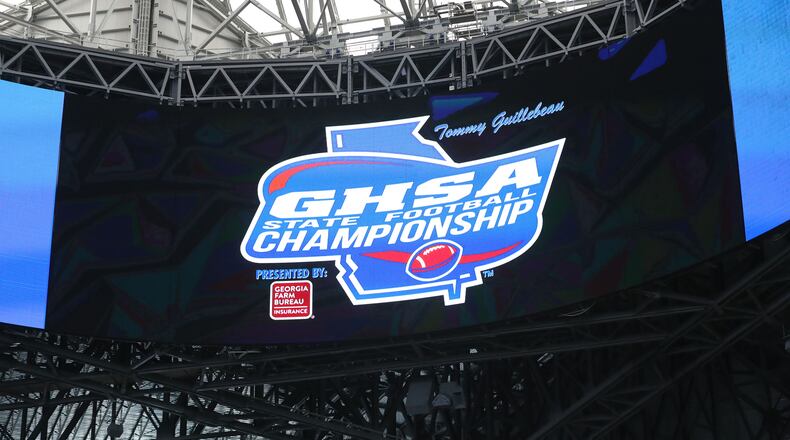Georgia High School Association executive director Robin Hines is on tour this month with stops in Warner Robins, Atlanta and Valdosta. Hines plays in a rock ’n’ roll band as a hobby, but he won’t be playing guitar or singing.
In his second academic year at the GHSA, Hines is calling these gatherings “public input meetings.” There’s one Tuesday at Houston County High. Hines and other GHSA officials will be at North Atlanta High on April 8 and Lowndes High on April 9.
“There were just a lot of erroneous information that would get back to us that just wasn’t based in fact,” Hines said. “We wanted to go get our story out there and talk about the structure of the GHSA, how it works, how the rules work, who creates rules — which is member schools, not the GHSA office. We’ll talk about finances, the fact that we’re a nonprofit and our goal is to break even every year. Then we give everybody an opportunity to say what they need to say. If they want to lodge a complaint, it’s a chance for us to hear it.”
Aside from decision making and money matters, those attending the first meeting last week in Cartersville High wanted to know about reclassification, specifically whether the association will contract to six classes beginning in 2020-21 or stay with seven.
The GHSA has sent surveys to its more than 450 member schools. A recent straw poll of the 16-member reclassification committee went 13-3 in favor of staying with seven classes, but it’s far from over. The committee will meet again April 15 in Macon to continue hashing it out.
Hines had supported the idea of trimming Georgia’s classifications to six.
“That way, 93 percent [of regions] would have seven-10 teams,” he said. “It would make it easier to find games, but other issues that go with six is that travel for some schools would actually increase. There’s positive sides to both, negatives to both. Until schools are spaced perfectly across the state, we’re going to have these issues.”
The GHSA also must decide whether to retain the 3-percent rule, adopted in 2016. That bylaw pushed the GHSA’s eight largest private schools — Marist, Woodward Academy, Lovett, Westminster, Blessed Trinity, Benedictine, Greater Atlanta Christian, St. Pius — into higher classifications to mitigate what some believed were unfair competitive advantages inherent in private schools.
Private and public schools with more than 3 percent of their enrollments from outside their counties were subject to being moved up, pending appeal, and that affected Buford, a city school. Cartersville is another city school, thus the special interest in reclassification expressed at last week’s public meeting.
Now, the committee is considering an enrollment multiplier for private and city schools, or letting the 3-percent (or similar) rule apply to students outside the specific school district and not the broader county area. Or such rules could be eliminated.
Also possible is a restructuring of Class A schools into private-only and public-only regions. Currently, many public and private schools play in the same regions but then go into separate public-school and private-school state playoffs. Keeping them integrated ensures that isolated Class A schools, both public and private, have nearby schools that are required to play them, but segregating them would allow a simpler method (ie, region standings) of determining state-playoff qualifiers. Currently, a points system seeds Class A schools in many sports.
The reclassification committee’s recommendations and an executive committee vote likely would not come until the fall.
A more pressing concern is the eligibility of home-schooled students in GHSA sports. A bill in the General Assembly would allow them to play for their local high school teams. Current GHSA rules forbid that.
The GHSA’s proposal, to be voted on April 15 by the GHSA’s executive committee in Macon, is to require that local school boards make those decisions and verify that home-schoolers are meeting the GHSA’s academic and disciplinary requirements to remain eligible.
“I’m all about local control,” Hines said. “With my background as a superintendent, I felt I knew what was best for my local community. I’m not sure the GHSA needs to be the gatekeeper as far as high school students are concerned.”
Hines’ main message to those at the public meetings, though, isn’t what will happen, but how it will happen. Neither he nor his office makes the rules; rather, it’s the 66-member executive committee that represents regions and member schools.
The executive committee also approves the budget. The GHSA is a 501(c)(3) organization. Its 2018-19 budget is $5,668,800 — equal to 2017-18 revenue.
“It’s been said that we’re out making money and handing out bonuses,” Hines said. “Nothing can be further from truth. This is a chance for us to clear up some misconceptions.”
And while Hines and the GHSA make proposals, it’s the executive committee that has the final say.
“There’s a lot that I do as executive director as far as day-to-day operations, but those are guided by bylaws,” Hines said. “The staff is hired by the association to interpret and enforce the rules. The process to change a bylaw is that if you think a rule is not appropriate, any member school can make a proposal to change it. If the executive committee or trustees agree, they’ll make that change.”
About the Author



